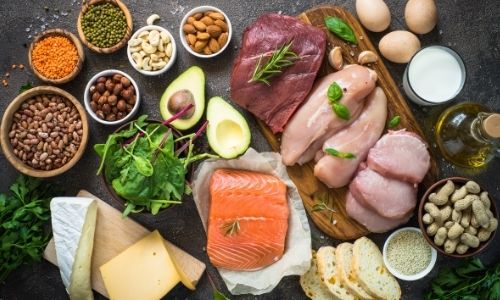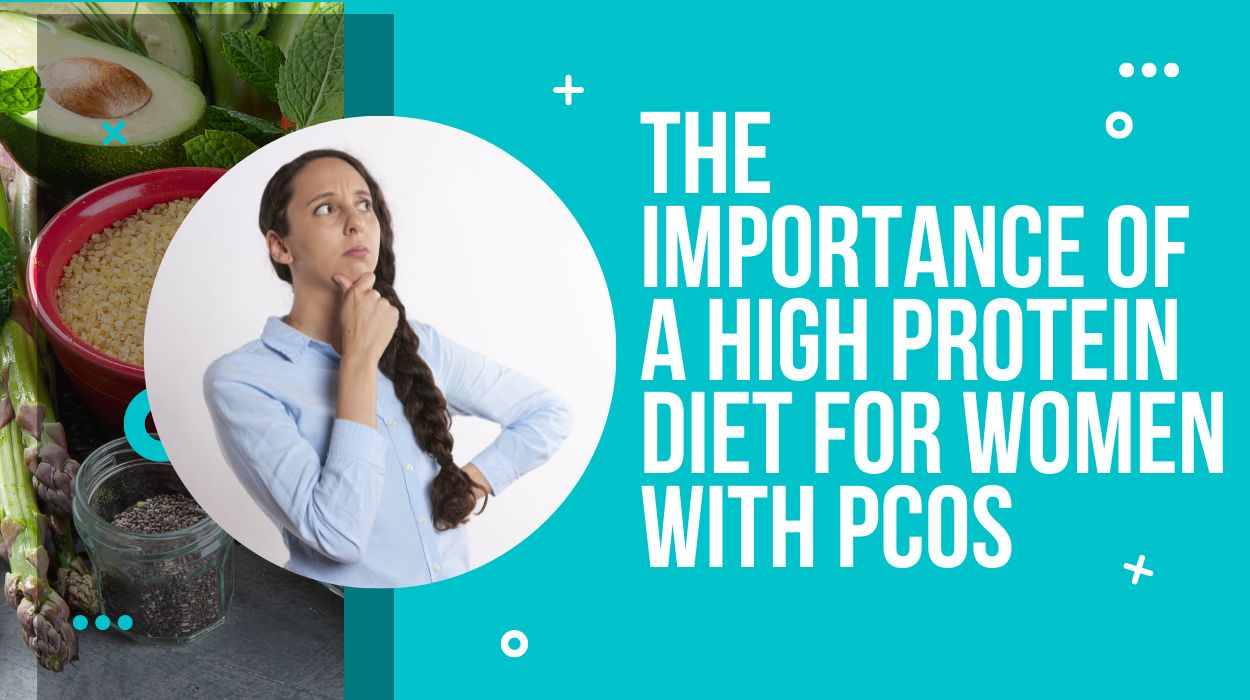Poly-cystic Ovarian Syndrome, popularly known as PCOS, is a hormonal disorder where the ovaries enlarge, and small cysts occur on the outer linings.
Did you know that approximately 22.5% of the Indian female population suffers from PCOS? It is, in fact, the most common endocrine disorder among women.
Moreover, people who suffer from PCOS are automatically susceptible to acquiring diabetes.
While PCOS is an incurable disorder, it is manageable. A critical component that helps regulate the severity is diet.
As you continue to read this article, you will learn why a high protein diet is essential for women suffering from PCOS, along with how much protein you should add to your diet and some tips to increase the duration of your results.
Why Is A High Protein Diet Important For Women Suffering From PCOS?

If you suffer from PCOS, it is essential to incorporate proteins into your diet. In fact, proteins should constitute 30% of your calorie intake.
To know more, let us look at the benefits of a high protein diet for women suffering from PCOS.
1. It helps balance hormonal activity
Proteins are known as the building blocks of your body. Thus, their function is to build hormones and enzymes.
PCOS disrupts the functioning of hormones such as estrogen, insulin, testosterone, etc., leading to a hormonal imbalance.
Estrogen is a hormone responsible for regulating the menstrual cycle.
On the other hand, testosterone is a male hormone secreted in the ovaries in small quantities. Testosterone, in females, helps grow and repair muscles and tissues.
Therefore, eating high-protein diets will help regulate hormonal functions.
2. It increases your metabolic rate
Eating a high-protein diet helps improve metabolism and digestion processes that effectively combat eating issues such as obesity.
Every food item consists of a specific thermic rate. Thermic rates affect your metabolic rate.
Since high protein diets have a higher thermic rate, they can significantly improve your metabolic rate. Foods containing protein have a thermic rate of 15-30%, which is significantly higher than carbohydrates (5-10%).
3. It helps to control excessive eating urges
As some of you know, PCOS affects your weight significantly. In most cases, women gain weight and face difficulty shedding extra fat off their bodies.
Protein-based diets trigger the production of hormones such as cholecystokinin that increase satiety levels in the body. In turn, the release of such hormones helps effectively control binge-eating urges.
A study shows that PCOS patients who followed a high-protein diet for six months lost nine pounds of body fat!
4. It helps balance blood sugar levels
Every food item we consume increases our blood sugar levels, and proteins are no exception.
However, because proteins digest slower than carbohydrates, fats, etc., the impact on our blood sugar levels is relatively lower.
Proteins convert into amino acids that gradually convert to glucose, unlike carbohydrates that convert to glucose directly.
5. It may help regulate mood changes and extremities
A study conducted by Gallety et al. highlighted the impact of high-protein diets on women suffering from PCOS. In this study, two groups of women had different diets.
While one group of women was on a low-protein and high-carbohydrate diet, the other group was on a high-protein and low-carbohydrate diet.
While there were no significant changes in the low-protein and high-carbohydrate diet group, researchers noticed some psychological changes in the other group.
Amidst women who ate high-protein and low-carbohydrate diets, there was a significant reduction in depression along with an improvement in self-esteem.
What All Should You Add To Your Diet?

While there are no specific diets for people suffering from PCOS, a high-protein diet also implies a low-carbohydrate and low-fat diet.
However, depending on your entire caloric intake, a suitable diet would consist of 30% to 40% proteins.
According to the Department of Health and Human Services, females who are 19 years and above should get at least 46 grams of protein in their diet.
While protein disintegrates gradually in the body, half of the food converts into glucose. However, this would only be beneficial if the diet only consisted of proteins.
No diet is incomplete without carbohydrates and fats. Therefore, a disbalance between the proportions of carbohydrates, fats, and proteins may increase blood sugar levels rapidly.
What To Consider While Making The Big Switch
If you want to switch to a high-protein diet to combat PCOS, you must speak to your trusted doctor or dietician, especially if you have other chronic health-related illnesses.
With the proper guidance of a medical expert, you may be able to achieve your target weight while getting all the nutritional value from your high-protein and low-carbohydrate diet.
There are abundant sources of protein to choose from for consumption. Let us look at some of these sources –
- Almonds – Almonds contain approximately 6 grams of protein per ounce.
- Oatmeals – Oatmeals contain approximately 11 grams of protein per cup.
- Yogurt – Yogurt contains approximately 7 grams of protein per 6 ounces serving.
- Milk – Milk contains approximately 8 grams of protein per cup.
- Quinoa – Quinoa contains approximately 8 grams of protein per cup.
Besides these options, you can also add protein to your diet from two primary sources – plants and animals.
Mostly, every animal protein is a complete protein as they contain every amino acid that helps in the proper functioning of the human body.
You May Also Like To Read:
India’s Best Whey Protein Powder
Cheap and Healthy Sources of Protein
Conclusion
Suffering from PCOS might take a toll on your mind, body, and health. People diagnosed with this hormonal disorder face many challenges to remain healthy and fit.
Therefore, eating the right kind of food may have an impact on other aspects of your body.
While there are numerous benefits of eating a high-protein and low-carbohydrate diet for PCOS patients, it is necessary to consult a doctor or a dietician before taking such a drastic step.
If you are a PCOS patient who has tried a high-protein and low-carbohydrate diet, please feel free to share your experiences with our readers in the comment section below.
We will always update our blog with informative and insightful articles. So make sure you stay connected with us and come back for more.


